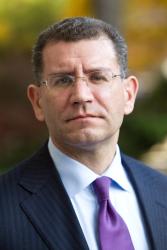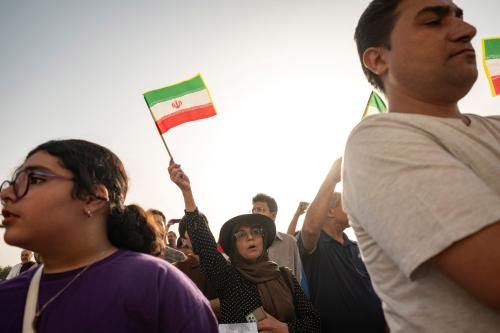

10:30 am EST - 12:00 pm EST
Past Event
10:30 am - 12:00 pm EST
1775 Massachusetts Ave., NW
Washington, DC
Winning the support of the Iraqi people has become a crucial aspect of the overall strategy to defeat the violent insurgency in Iraq. To examine Iraqi public opinion and to discuss the results of an in-depth poll conducted by the Program on International Policy Attitudes (PIPA), the Saban Center hosted a group of leading experts. Steven Kull, director of PIPA and editor of WorldPublicOpinion.org presented the findings of the recent poll (conducted January 2-5, 2006) and the study of the poll: What the Iraqi Public Wants. Kenneth M. Pollack, the Saban Center’s Director of Research, and Shibley Telhami, Saban Center Nonresident Senior Fellow and the University of Maryland’s Anwar Sadat Professor for Peace and Development, provided their insights into the findings.
Kull summarized the attitudes of Iraqi people on several key issues, including the presence of U.S. forces in Iraq, current developments in Iraq, and international assistance. In terms of Coalition forces, the poll indicates that the Iraqi public largely believes that the United States will continue to maintain permanent bases in Iraq, even if asked by the newly elected government to leave. The majority of Iraqis are in favor of establishing a timetable for the withdrawal of U.S. forces from Iraq, although there is a division of views over six-month and two-year timetables. Eighty three percent of Sunnis strongly favor a withdrawal of Coalition forces within six months. The majority Shi’ah community is divided—22 percent of Shi’i respondents favor the withdrawal of U.S.-led Coalition forces in six months compared to 49 percent who favor the two-year timeline for withdrawal. Fifty seven percent of Kurds approve a reduction in Coalition forces when the situation in Iraq stabilizes.
The results of the poll indicate that nearly half of Iraqis approve of attacks on U.S.-led Coalition forces. At the same time, a majority of Iraqis do not approve of attacks on the Iraqi government, Iraqi security forces, or Iraqi civilians. This attitude, however, varies significantly along sectarian lines, with Sunnis constituting an extraordinary majority of those who support attacks on U.S.-led forces. Kull noted that 41 percent of Iraqis who approve attacks on foreigners do not favor a near-term withdrawal. In Kull’s interpretation, this suggests that attacks are aimed to pressure the United States to leave “eventually” not “immediately.” Kull was asked to comment on why most Iraqis support attacks on outsiders and yet reject terrorism. Kull responded that Iraqis do not perceive attacks on U.S.-led forces as acts of terrorism.
While most Iraqis believe that certain aspects of their lives would improve if the Coalition forces were to leave, they are doubtful about the capability of Iraqi security forces to stand on their own. This would explain why only 35 percent of respondents favor an immediate withdrawal of U.S.-led troops.
Kull pointed to a trend regarding whether respondents felt Iraq was headed in the right or the wrong direction. The poll indicates that optimism among Iraqis increased as elections drew near. However, these results also varied along sectarian lines. As the study indicates, an overwhelming majority of Sunnis believe that the political process is moving in the wrong direction. In Kull’s opinion, Sunni rejection of the elections and the new Iraqi government confirms that integrating Sunnis into Iraq’s political process still presents a formidable challenge.
According to the poll, many Iraqis strongly support international involvement in the form of UN leadership of reconstruction and assistance. Kurds constitute the highest percentage of those favoring U.S. leadership of the reconstruction. In contrast, Sunnis vehemently oppose any American involvement in Iraq, instead favoring international assistance. Kull argued that were the reconstruction campaign to have been more internationalized, there would have been a better chance of winning Sunni support. For instance, nearly two-thirds of Iraqis (64 percent) support the idea of convening an Arab conference in order to help stabilize Iraq (although they remained largely skeptical about the role of Iran and Syria). Relating to this, a participant asked whether Iraqi attitudes toward Iranians and Syrians differ along sectarian lines. Kull observed that Iranians tend to be perceived positively among the Shi’ah whereas Syrians are viewed unfavorably by all Iraqis.
Those Iraqis who disapproved of U.S. participation in any non-military activities nevertheless agreed that they would change their opinion about American involvement if the United States announced a timetable for withdrawing its troops. Kull concluded that one of the most important findings of the study was that the Sunnis’ negative attitude towards the American presence in Iraq rests on the fact that there is no clear timetable for a withdrawal. According to Kull, this conclusion suggests that there is some potential for changing Sunni attitudes by changing their perception of being occupied by a foreign force which has no intention of leaving.
Following Kull’s presentation, Kenneth Pollack, the Saban Center’s Director of Research, commented on some of the findings. Pollack agreed with Kull that the timing of a poll was very important. He interpreted the upswing in Iraqi attitudes close to elections as indicative of Iraqis’ expectations that the new government would secure a better future for them. Pollack argued that Iraqis are most concerned about basic needs, such as security, employment, clean water, electricity, and gasoline, and that each time a new government is formed they believe that it is going to deliver on basic services. Pollack noted that this was true of the Office of Reconstruction and Humanitarian Assistance, the Coalition Provisional Authority, the Iraqi Governing Council, the Iraqi interim government and the Iraqi transitional government, all of which failed to deliver, and as a result, public support and expectations waned in the aftermath of the elections. Pollack pointed out that there was no elections scheduled for the next four years and therefore it was critical to ensure that the new Iraqi government begins delivering and addressing its people’s concerns.
Pollack noted that the poll was useful in terms of conveying the general feeling of Iraqi suspicion and disappointment with reconstruction efforts and the United States. In Pollack’s opinion, this frustration explains why most Iraqis favor a timeline for an American withdrawal of the United States. However, Pollack cautioned that an announcement of a withdrawal date could entail serious consequences. If the United States were to announce a timetable for withdrawal, those Iraqis who understand that Iraqi security forces are not yet capable of stabilizing Iraq would perceive this announcement as setting a date for the outbreak of a potential civil war. As a result, they would start making deals with various factions to protect themselves were the civil war to break out.
Pollack argued that the issue of U.S. withdrawal is paramount in Iraq, because of a culture that prides nationalism and therefore rejects any foreign presence on Iraqi soil. As the poll indicates, the majority of Iraqis favor an intermediate period for U.S. withdrawal that falls between six months to two years. According to Pollack, this result points to the fact that although most Iraqis recognize that Iraqi security forces and institutions are not yet capable of controlling Iraq, their patriotism makes it difficult for them to accept a foreign occupation. Pollack suggested that those Iraqis who support a two-year timetable for U.S. withdrawal are more fearful of a civil war than of a foreign occupation.
Pollack argued that Iraqi support for attacks on Americans results from a deep sense of nationalism. Iraqis do not necessarily believe it is the right thing to do but they understand why their fellow countrymen are frustrated and conduct the attacks. Pollack explained that this strong concept of nationalism and pride is why Iraqis reject the concept of terrorism but support attacks on U.S.-led forces.
Pollack concluded by arguing that the while Iraqi people are increasingly frustrated with the reconstruction effort, they desperately want it to succeed. Therefore, it is critical for the United States to start improving the daily lives of Iraqis before more Iraqi citizens join the insurgency.
Shibley Telhami compared the results of the PIPA poll to the polls that he recently conducted in six Arab countries: Egypt, Jordan, Saudi Arabia, Morocco, the United Arab Emirates, and Lebanon. He observed that like Iraqis, Arabs outside of Iraq are concerned about a long-term U.S. presence in Iraq. However, Telhami said that the greatest fear of people in these countries is the division of Iraq. Telhami observed that a vast majority of Arabs outside Iraq believe that Iraqis are worse off today than they were before the war. This result, he argued, is consistent with the PIPA finding that an overwhelming majority of Sunni respondents are convinced that Iraq is on a wrong course—however, as a whole, 64 percent of Iraqis believe that Iraq is moving in the right direction. Telhami explained that this consistency resulted from Arabs’ perception of Iraq through two prisms: a Sunni prism and the U.S. presence prism.
Telhami observed that most Arabs profoundly mistrust American intentions. They are confident that the United States invaded Iraq to control oil and help Israel. Very few Arabs believe that the United States is in Iraq to promote democracy, human rights, or peace. Therefore, while most Arabs acknowledge the benefits of removing Saddam Hussein from power, they are suspicious of the United States’ motives.
Telhami expressed concern over the growing sectarian divide among Iraqis. He pointed out that the Shi’ah population of Iraq is more diverse and divided on various issues than Americans may think. The lack of unanimous Shi’ah voice, Telhami cautioned, presents a major obstacle for the political process and reconstruction in Iraq.




Pavel K. Baev, Robert Einhorn, Sharan Grewal, Samantha Gross, Ryan Hass, Patricia M. Kim, Elizabeth N. Saunders, Yun Sun, Caitlin Talmadge, Shibley Telhami, Andrew Yeo
July 1, 2025

Suzanne Maloney
June 28, 2025

Suzanne Maloney
June 22, 2025